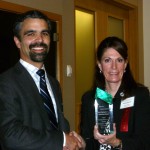Anthony Broadman was elected as Chair of the WSBA Administrative Law Section at its annual meeting yesterday in Seattle. Anthony, a Partner with Galanda Broadman PLLC, a boutique Seattle law firm that he co-founded in 2011 with Gabe Galanda, will serve as Chair of the Section until September 2012.
The Administrative Law Section serves the interests of public and privatesector attorneys who work with state, local and tribal government agencies, as well as administrative law judges, hearing officers, review officers and other judicial personnel.
Anthony’s practice focuses on representing tribal governments in jurisdictional and taxation disputes. His scholarship has focused largely on tribal interests and the law of administrative agencies. From 2007 to 2010, Anthony practiced at a medium-sized regional firm, focusing on litigating issues critical to tribes and businesses operating in Indian Country.
Anthony has appeared before Washington state trial courts, federal district courts, and tribal, state and federal administrative bodies. Anthony has diverse trial and litigation experience, ranging from arguing and obtaining an injunction against the U.S. Department of Agriculture in federal court, serving – successfully – as lead trial counsel for a Fortune 500 company in a Washington business dispute, to his jury trial defense of a public employer at the state trial court level. In 2010, Anthony was named a Rising Star by Washington Law & Politics magazine.
Anthony has previously served as Chair-elect, Treasurer, and Secretary of the Washington State Bar Association Administrative Law Section and is a Trustee of the Washington State Bar Association Indian Law Section. He is editor of the Indian Law Newsletter, published by the Indian Law Section and is admitted to practice in Oregon and Washington.
Galanda Broadman PLLC is a majority Indian-owned law firm that represents tribal governments, businesses and members in critical litigation, business and regulatory matters. The lawyers of Galanda Broadman PLLC – Gabe Galanda, Anthony Broadman and Ryan Dreveskracht – earned their law degrees from the University of Arizona College of Law. For additional information about Anthony or Galanda Broadman, visit galandabroadman.com.







